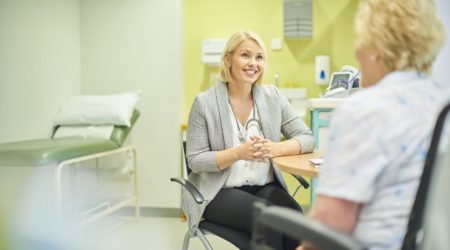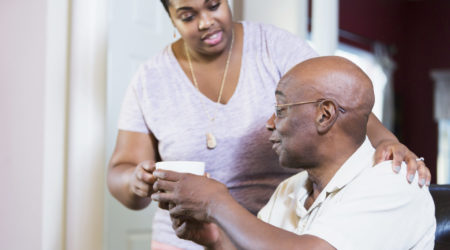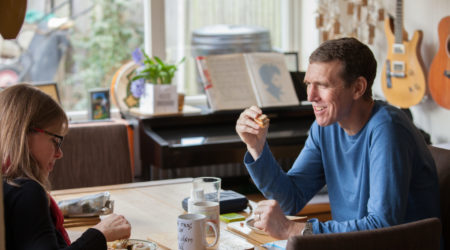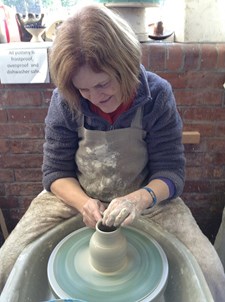

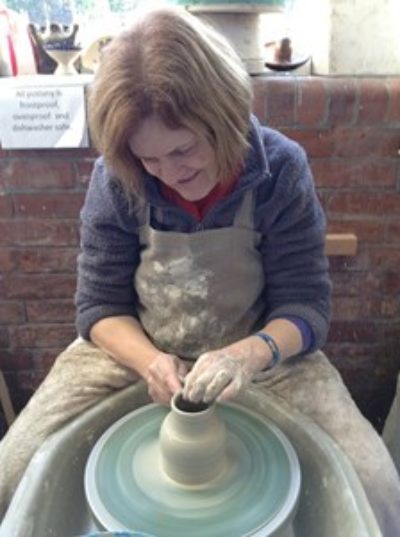

Susan
Susan, 57, was diagnosed with a neuroendocrine tumour of the pancreas.
I visited my GP in late March with a stomach upset that wouldn’t go away. I had a gastroscopy within a week. The GP thought I had stomach ulcer. The results were ‘inconclusive’.
Another gastroscopy and a CT scan were done and I saw a consultant within 10 days of these where I was told I had a malignant incurable, inoperable neuroendocrine tumour affecting my pancreas. I then had an appointment with an oncologist who was hopeful that chemotherapy would work.
Deciding on treatment
Doing research (scary!), I discovered that a specialist centre had a cancer tissue bank for research. I emailed asking how I could give them my tumour when I died. (I discovered later that my email was sent on to the consultant who is particularly interested in my sort of tumour.)
I had a phone call from the Upper GI Nurse Specialist telling me that a surgeon at the hospital thought he could operate. I was then sent for an octreotide scan, which involves three visits on three consecutive days.
On my first visit to the hospitals outpatients, I saw the surgeon’s assistant and he told me there was a 20% chance I would die on the table.
I then saw the surgeon who told me what he was proposing to do. He was very open about the risks involved, both operative and post-operative. The post-operative risks sounded particularly nasty.
My choices were:
- Chemotherapy for 3 months. If it didn’t work the tumour would have grown so much that it would really be inoperable.
- ‘Extreme surgery‘ – removal of pancreas, spleen and stomach and major replumbing. There was a possibility that they would need to use part of one of my jugular veins (we have more than one, I learned).
I felt between a rock and a hard place.
Surgery and recovery
In July 2011 I was admitted to the specialist centre where they marked my legs up (with black permanent marker, which took ages to get off!) in case they needed the veins. The operation, which went smoothly, took 12.5 hours. They removed a tumour weighing 5kg, measuring 22cm. I then spent one day in intensive care and two days in high dependency, where the physiotherapist got me up and walking.
I was in hospital for 2 weeks and followed this with a week in a private hospital because the surgeon and my family were concerned about my being discharged before I was really ready to go home. For nearly 2 weeks I lived on intravenous food and then a pureed diet (exciting! ), then a soft diet for a while before returning to a ‘normal diet’.
In hospital my diabetes was managed by the nursing team, but when I went into the private hospital I was able to start managing my diabetes myself with support and encouragement from the nurses. I had my first hypo in the private hospital – but they helped me deal with it.
My lack of stomach means that I have to eat every hour, which makes my diabetes difficult to control. At the moment they are trying to treat me as a 3 meals a day diabetic which is not working. I am going to talk to the consultant about the suitability of an insulin pump. The Macmillan dietitian is incredibly helpful and supportive.
I am 4.5 months post op and feel a million times better than I did a month ago and life is definitely worth living, although I have my ups and downs.
My diabetes is a work in progress.
December 2011
Update October 2015
I’m now four and a half years post diagnosis and 4 years 2 months post operation and have just been to see my surgical consultant for my annual check up. I’m delighted to report that my scan is clear and I feel well.
With the operation I had, I have some long term side effects which have become apparent recently: I have significant osteoporosis – I’ve been sucking calcium tablets for four years, but have malabsorption problems. I’ve just succeeded in convincing the medics that I would benefit from annual Zoledronate infusions instead. I also have problems with absorbing Vitamin D – so an addition to my daily medication.
Diabetes wise – I have an insulin pump – worth the fight to achieve it. I’m now on a mission to convince the ‘powers that be’ that a continuous glucose meter would be worth the money to keep me safe and healthy. I think this is more of a challenge than getting a pump was. It’s a great shame that so many decisions are purely financial.
I have tremendous problems with gas in my gut – inflating like a balloon over the course of a day (increasing by about three dress sizes!). One thought was that it’s irritable bowel syndrome. Cutting out foods that may cause gas has certainly made things much better, but my surgeon thinks it’s bacterial overgrowth in my gut as I have no stomach acid, so I’m going to see a gastroenterologist about this. Hopefully he’ll have some bright ideas! I gave them an armful of blood last week and have to provide a 24hr urine collection as well. I really know how to have fun!
I still take Creon like it’s going out of fashion.
It’s so important to stand up for ourselves. We are worth the best treatment, but it seems we don’t get it without fighting. I’m lucky that I’m well enough to do this.
Looking forward; in July 2016 I’ll change my local hospital’s 5 year survival rate for pancreatic cancer from 0 to some small percentage. Look out for me in the news.


